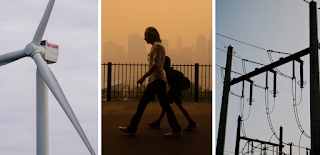We're All Climate Economists Now - Economics' Pivotal Shift in the Face of Climate Crisis
Introduction: The world of economics is experiencing a profound transformation, with the urgent climate crisis taking center stage. The aftermath of the hottest recorded year has catapulted climate-related topics into the spotlight at major economic conferences. The recent surge in research papers and discussions at the forefront of the field signals a collective awakening — "We're All Climate Economists Now."
Economics' Climate Spotlight: Traditionally, economic conferences serve as mirrors reflecting the profession's current focal points. In the wake of climate-related challenges, topics such as the economic impact of wind turbine manufacturing, stability of electricity grids with increased renewable energy, and the effects of climate on various sectors have dominated discussions.
Environmental, Social, and Governance Investing: A noteworthy shift is observed in the American Finance Association, where half of the submitted papers revolve around environmental, social, and governance (ESG) investing. This surge underscores the growing importance of sustainable and socially responsible financial practices.
Key Themes Explored: The conference delved into diverse themes, including the economic implications of climate-related uncertainties, migration influenced by extreme weather, and the multifaceted impact of higher temperatures on industrial productivity.
Economists' Call to Action: Janet Currie, the incoming president of the American Economic Association, emphasized the interconnected nature of the climate crisis, urging economists and professionals from all fields to address it collectively. The imperative to shift to renewable energy and mitigate deadly air pollution, especially in developing nations, took center stage in the keynote lecture delivered by environmental economist Michael Greenstone.
Evolution in Climate Economics: While economics has historically acknowledged climate change's economic consequences, recent years have witnessed a paradigm shift. Former perceptions of climate issues as externalities with straightforward solutions have evolved into recognizing the complexity of underlying economic tensions and mechanisms.
Incentives for Clean Energy Production: The failure of a cap-and-trade approach in 2009 led to the emergence of a new strategy — incentivizing clean energy production. This approach, more attuned to political realities and equitable distribution of costs and benefits, has garnered attention in economics circles.
Expanding Horizons and Diversity in Economics: The surge in climate-related questions has opened new avenues for research, fostering diversity in economic discussions. Young researchers are drawn into the field, with opportunities booming in academia, government agencies, private companies, and nonprofit think tanks.
Growing Demand for Climate Economists: Job postings for climate economists have skyrocketed, with a fivefold increase in the mention of "climate change" in ads from 2013 to 2023. Government agencies, especially since President Biden's tenure, have embedded climate priorities into regulations, economic growth projections, and budget forecasts.
Conclusion: As economics catches up with the urgency of climate action, the evolving literature provides a unique opportunity to guide transformative policies. The collaboration between economists and policymakers becomes crucial, with the field poised to contribute significantly to shaping a sustainable future.
- #ClimateEconomists, #EconomicShift, #ClimateAction, #SustainableFinance, #RenewableEnergyTransition

